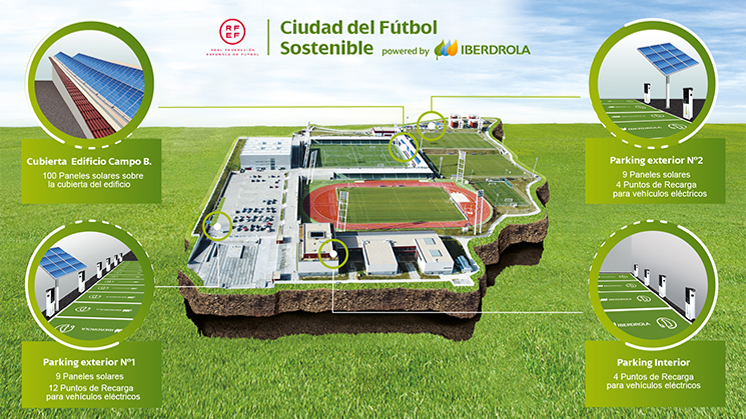Iberdrola and the RFEF promote the first City of Sustainable Football
- The sports complex will have a self-consumption system made up of 110 photovoltaic panels to illuminate the matches of the national teams with renewable energy.
- Iberdrola will also install 20 charging points for electric vehicles to promote sustainable mobility among sportsmen and women and fans.
- The initiative extends the collaboration signed by both entities to promote the first Sustainable Selection, developed on the occasion of the Women's World Cup in France.
Iberdrola and the Royal Spanish Football Federation (RFEF) have signed a collaboration agreement to promote the first Sustainable Football City at the training facilities of the Spanish national football teams in Las Rozas, Madrid.

The agreement will allow the installation of a self-consumption system made up of 110 photovoltaic solar panels on roofs and canopies that will allow the matches of the different football teams to be lit with renewable energy. The production of this installation is equivalent to the annual consumption of 30 households and will avoid the emission of 22 tCO2/year.
The facilities will also be equipped with 20 charging points for electric vehicles to promote sustainable mobility among athletes and fans. Any electric vehicle user who comes to the facilities will be able to make use of these charging points with the guarantee of using 100% green energy, from clean generation sources. The electric charging points will be available on the 'Recarga Pública Iberdrola' mobile app, the only one that includes verified information on all the electric vehicle chargers in operation in Spain and which can be used to manage the geolocation of the charger, reserve it and pay for the charging from the mobile phone.
"At Iberdrola we have been committed for years to promoting sport practiced by women with the conviction that, through our actions, we are fighting for equal opportunities. But with alliances like today's we go further, extending the transformation capacity of our sustainable activities to the field of sport. Making Ciudad del Fútbol the first sustainable sports city allows us to demonstrate the extraordinary impact of an energy model that, like sport, plays fair, is competitive and sustainable and offers inclusive opportunities for all", explains Juan Luis Aguirrezabal, Iberdrola's Director of Advertising, Brand and Global Sponsorships.
"This initiative allows us to extend our commitment to sustainable development goals. It is a great satisfaction for the Royal Spanish Football Federation to be able to develop the Iberdrola Sustainable Football City project at the home of Spanish football", said Rubén Rivera, marketing director of the RFEF.
This new agreement extends the one signed by both entities on the occasion of the Women's World Cup in France in 2019, which has made it possible to promote the first Sustainable Selection through initiatives such as offsetting the carbon footprint generated by the Spanish Women's Football Team with green energy.
Iberdrola, a pioneer in promoting sport for women
The promotion of sport by women has become a key lever for Iberdrola and the promotion of real equality between men and women, one of its core values. In 2016, Iberdrola became the first company to make a firm and global commitment to equality and the empowerment of women through sport. The company currently supports 16 federations: gymnastics, triathlon, rugby, canoeing, badminton, football, handball, volleyball, hockey, table tennis, athletics, karate, boxing, surfing, ice sports and fencing. It also gives its name to 22 leagues, all of them at the highest level, and to 35 other competitions.
In parallel, Iberdrola's contribution of resources, facilities, medical services and referees and the promotion and sponsorship of initiatives has not only helped to increase by 39% the number of members in the aforementioned disciplines -to over 300,000-, but is also enabling Spanish elite athletes who have developed their sporting careers in other countries to return to compete in Spain, contributing to increasing the level and visibility of national competitions.
